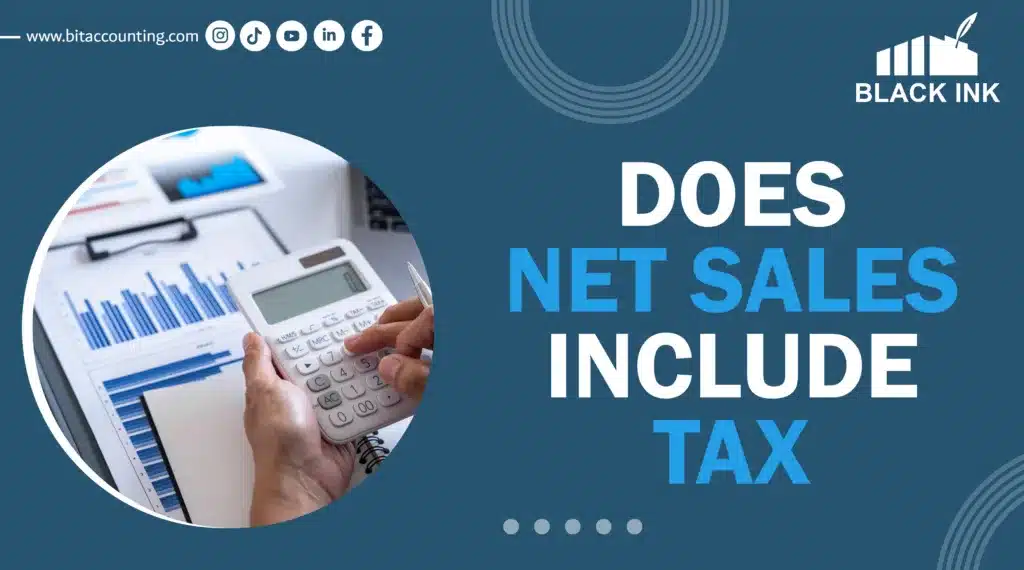Blogs
Does Net Sales Include Tax? Understanding the Basics

When it comes to running a business or managing finances, one common question pops up: Does net sales include tax? If you’ve ever looked at a sales report or income statement and scratched your head trying to figure out what’s actually being counted, you’re not alone.
Understanding what goes into “net sales” is super important. Whether you’re a small business owner, an accountant, or someone just trying to get better at reading financial statements, knowing how sales tax fits (or doesn’t fit) into net sales can make a big difference.
In this blog, we’ll break down what net sales really mean, how sales tax is handled, and why the two are treated separately in accounting. We’ll keep things simple and straight to the point—no fancy finance talk here, just practical answers you can actually use.
What Are Net Sales?
Let’s start with the basics. Net sales are the total sales a business earns after subtracting a few things:
- Sales returns – When a customer gives back a product and gets a refund.
- Allowances – Price cuts due to product issues (like damage or defects).
- Discounts – Special deals or offers that lower the final sale price.
So, if a business makes $10,000 in total sales, gives out $500 in discounts, and gets $200 in returns, the net sales would be:
Net Sales = Gross Sales – Returns – Allowances – Discounts
Why Net Sales Matter
Net sales show up on your income statement and are one of the best ways to track how your business is doing. They help you:
- See your real revenue after adjusting for returns or deals.
- Analyze profit margins more clearly.
- Make better decisions when planning or budgeting.
So, understanding what goes into this number—and what doesn’t—is key.
Understanding Sales Tax
Before we jump into the main question, let’s quickly go over what sales tax actually is.
Sales tax is a fee added to the selling price of goods or services. It’s set by the government (like your state or city) and collected by the business at the time of sale.
But here’s the thing: that money doesn’t belong to the business. You’re just collecting it and passing it along to the tax office.
How Sales Tax Works
- Depends on location – States and cities can set different sales tax rates.
- Usually a percent – For example, if you’re charged 10% on a $100 sale, you pay $10 in tax.
- Not part of revenue – The business doesn’t earn that $10—it just holds onto it until it’s paid to the government.
Think of the business as a middleman. You collect the tax for the government, but it never becomes your income.
Does Net Sales Include Tax?
Here’s the answer you’ve been waiting for:
No, net sales do not include sales tax.
Net sales reflect only the income from what you sold—the actual goods or services. Sales tax is not income. It’s money you collect on behalf of the government, so it’s handled differently in accounting.
Accounting Treatment of Sales Tax
Let’s compare a few terms:
Term | What It Includes | Does It Count Sales Tax? |
Gross Sales | Full amount before deductions | No |
Net Sales | Gross sales minus returns/discounts | No |
Sales Tax | Extra fee added at checkout | Separate liability |
Sales tax is recorded on the books as a liability, not as income. That means it’s money the business owes to someone else—specifically, the tax authority.
Example Scenario
Let’s say you sell a shirt for $100 and your state adds 10% sales tax.
- Customer pays: $110 total
- Gross sales: $100
- Sales tax collected: $10
- Net sales: $100 (assuming no returns or discounts)
That extra $10 doesn’t count in either gross or net sales. It’s listed separately as a sales tax payable.
Exceptions & Industry-Specific Cases
In some cases, especially outside the U.S., prices might include tax already (this is called “tax-inclusive pricing”).
For example:
- VAT systems (used in the UK, EU, etc.) often include tax in the sale price.
- In those cases, businesses must back out the tax to find the real net sales.
So depending on your region, the math and reporting might look a bit different—but the idea remains the same: sales tax is not part of your revenue.
Why Net Sales Exclude Tax
So why are taxes kept out of net sales? Simple: accounting rules say so.
GAAP & IFRS Standards
Under both GAAP (Generally Accepted Accounting Principles) and IFRS (International Financial Reporting Standards), revenue and taxes must be kept separate.
This keeps financial statements honest and consistent. No one wants to mix up what a company earns with what it collects for the government.

Impact on Financial Statements
- Income Statement: Net sales show how much money the business made from sales—not from tax collections.
- Balance Sheet: Any tax collected but not yet paid shows up as a short-term liability under “Sales Tax Payable.”
Tax Compliance & Audits
Keeping tax and revenue separate also helps during:
- Audits – Clean records reduce mistakes and penalties.
- Tax filing – Makes reporting what you owe easier and more accurate.
Common Misconceptions About Net Sales & Tax
Let’s bust some myths.
Myth 1: “Net Sales and Gross Sales Are the Same”
Nope. Gross sales are your total sales before you remove returns, allowances, or discounts. Net sales come after those deductions.
Myth 2: “Sales Tax Increases Revenue”
It might feel like you’re earning more when a sale goes from $100 to $110 with tax—but that extra $10 isn’t yours. It’s just passing through your hands.
Myth 3: “All Taxes Are Deducted from Net Sales”
Not true. Only returns, discounts, and allowances reduce net sales. Taxes don’t touch that number.
How to Properly Record Net Sales & Tax
Here’s how you actually record this stuff the right way.
Step-by-Step Accounting Process
- Record gross sale (product price before tax).
- Subtract any returns, allowances, or discounts.
- Calculate net sales.
- Record sales tax separately as a liability.
Journal Entry Example
Let’s use our $100 shirt with $10 sales tax:
- Debit: Cash – $110 (you received this from the customer)
- Credit: Revenue – $100 (your net sale)
- Credit: Sales Tax Payable – $10 (what you owe to the state)
Software & Automation
Tools like QuickBooks, Xero, or Zoho Books make this process easier. They can:
- Separate revenue and tax automatically.
- Track what you owe in sales tax.
- Help you file reports on time.
International Considerations
Taxes work differently around the world.
VAT vs. Sales Tax
In places with Value-Added Tax (VAT):
- The price you see often includes the tax.
- Businesses must break out the VAT portion to find their real revenue.
Global Compliance Challenges
If you sell in different states or countries, you’ll need to:
- Understand local tax laws.
- Track and report tax for each area separately.
This can get tricky, which is why using software or consulting a professional is smart.
Practical Tips for Businesses
Here’s how to stay on top of it all.
Best Practices for Handling Sales Tax
- Keep clean records of what you earn vs. what you collect in tax.
- Reconcile your tax accounts often.
- Use software to cut down on manual work.
Avoiding Common Mistakes
- Don’t mix sales tax into your revenue totals.
- Make sure to report and pay taxes on time.
- Always double-check your sales tax rates and rules.
Conclusion
So, does net sales include tax? Now you know the answer: No, it does not. Net sales only reflect what your business earns from selling goods or services, not what it collects in sales tax. Keeping this clear in your books is not just smart—it’s necessary.
If you’re still unsure about your sales numbers or how to handle tax reporting, reach out to professionals from BIT Accounting. They help businesses just like yours stay accurate, audit-ready, and confident in their numbers.
FAQs
Gross sales are total sales before any deductions. Net sales subtract returns, discounts, and allowances.
No. Sales tax is collected for the government and recorded as a liability—not income.
In most cases, no. However, in some countries where tax is built into the sale price, you may need to subtract the tax to find the real net sales.
Tools like QuickBooks and Xero automate tax tracking, separate revenue and tax, and make filing easier.



